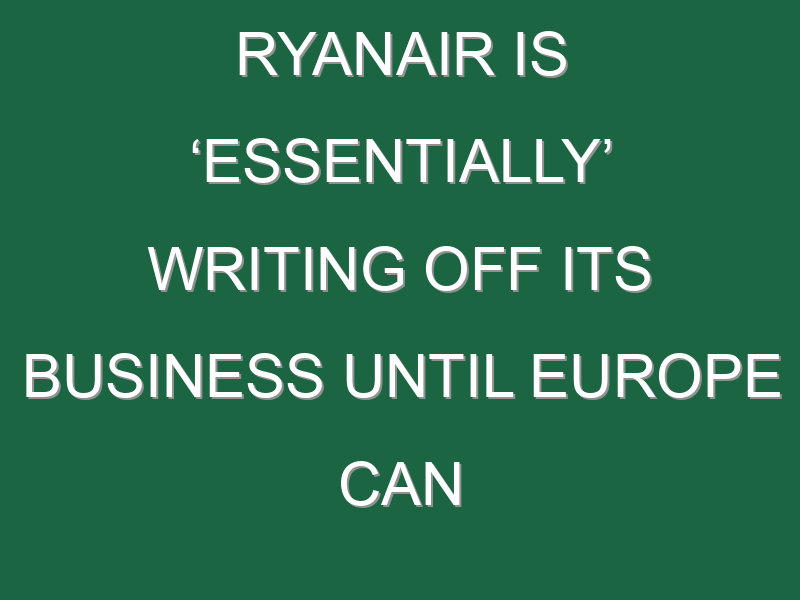Ryanair Holdings Plc. is counting on a rapid rollout of coronavirus vaccines to deliver a late-summer travel surge and help the low-cost carrier recover from an annual loss that could reach 950 million euros ($1.1 billion).
While Easter is “essentially a writeoff,” the passenger tally may rebound to between 50% and 70% of normal levels in the peak months of July through September as more people get the jab, Chief Executive Officer Michael O’Leary said in an interview Monday.
“You’re going to see a dramatically accelerated rate of vaccination across the European Union,” O’Leary said on Bloomberg TV. “That’s the point where we are released from these restrictions. Short-haul travel will recover strongly and quickly. There is huge suppressed travel demand in Europe.”
Europe’s airlines are in a precarious spot with the collapse in travel persisting after a full year of crisis. The outlook for a rebound is dependent on a vaccine roll-out that’s proceeded slowly so far, while new virus strains have kept case counts stubbornly high.
Ryanair, Europe’s biggest discount airline, expects to carry as few as 26 million people in the fiscal year ending in March, compared with 149 million in fiscal 2020. Governments have responded to new virus surges with tougher rules and told citizens that it’s premature to book summer holidays.
The Irish carrier fell as much as 3.9%, and was down 0.9% as of 8:18 a.m. in Dublin. Air France-KLM rose as much as 2.5% after Finance Minister Bruno Le Maire said more aid for the carrier is coming after the country tightened restrictions.
Cautious View
Sanford C. Bernstein analyst Daniel Roeska said that while Ryanair provided “little evidence when investors can expect better fortunes,” the carrier’s low cost base means that it’s “geared to the recovery and will be able to capture market share as other airlines remain debt-laden and slow.”
O’Leary said he may need to revisit his optimism about the pace of a revival if vaccination programs are delayed or prove unsuccessful, but that current scenarios point to a recovery through the remainder of 2021 and a stronger rebound next year.
The CEO said Europe has been slow with inoculations but that the bulk of the continent could still be protected by September. Eurocontrol, the region’s air traffic control agency, said last week that flights could still be down by between 55% and 70% from 2019 levels in June.
In France, the government imposed tighter rules on travel in a bid to avoid a third national lockdown.
Starting Sunday, the country sealed its border for travel between countries outside the European Union, except for extenuating circumstances, and is requiring negative Covid-19 tests for anyone entering France, including from within the EU, and by any means of transport.
“Air France will need extra support, the state will provide extra support,” Le Maire said on RTL radio. The airline last year received a total of 10.4 billion euros in direct loans and guarantees from France and the Netherlands and has been in talks with both governments for another package.
Winter Bust
Ryanair reported a net loss of 306 million euros in the third quarter ended Dec. 31 after border restrictions and lockdowns wiped out much of usual Christmas travel surge. The Dublin-based carrier’s December passenger count tumbled 83% to just 1.9 million people, it said in a statement.
Chief Financial Officer Neil Sorahan said Ryanair had about 3.5 billion euros in cash at the end of December, with “lots of options available,” including attractively priced bond markets, should it need to raise funds.
The CFO said he’s hopeful a higher-capacity version of Boeing Co.’s 737 Max will be certified by the end of February or in early March, with 24 deliveries planned by the next summer. The plane, grounded for almost two years after two fatal crashes, was cleared to fly by European regulators last week.
More must-read stories from Fortune:
- Famed economist Robert Shiller has a new metric to value the stock market. Here’s what it’s saying
- When will Biden’s $1,400 stimulus check pass? Here’s everything to know
- A stock market correction may be around the corner. Here’s how investors should play it
- Beware Goldman’s latest prediction about the stock market
- How this family-run seafood business banded together to stay afloat for the next generation



